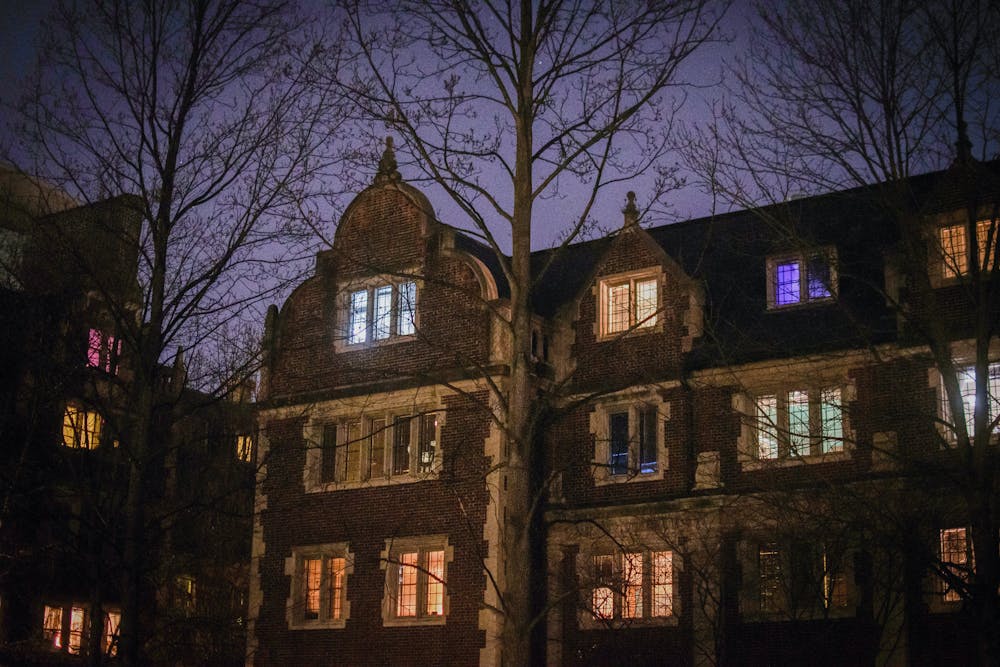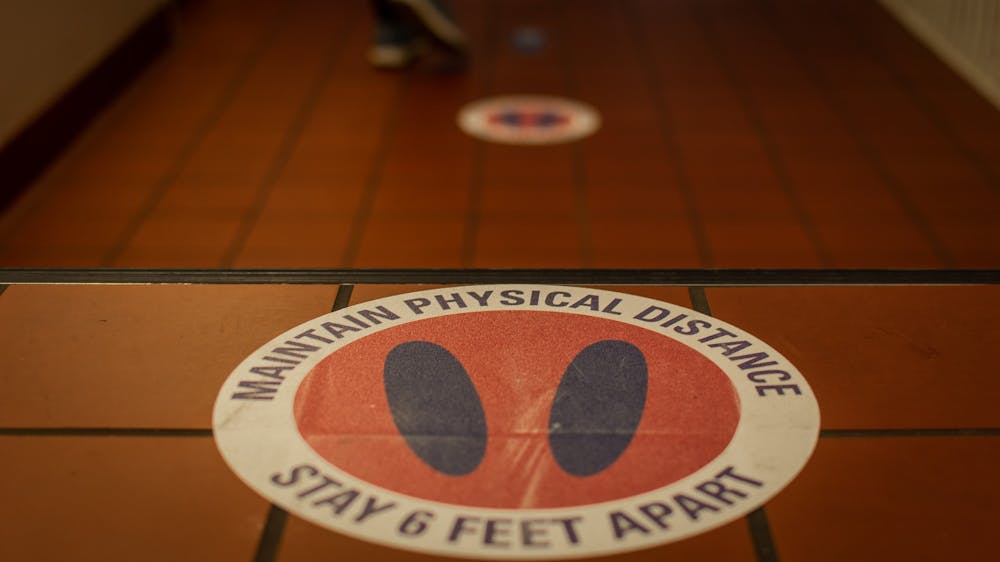
Multiple RAs have filed reports of first-year students partying in the Quad, which violates Penn's Quiet Period.
Credit: Max MesterWithin days of moving in, first-year students are reportedly partying in college houses and breaking Penn's COVID-19 guidelines, angering students, residential advisors, and graduate associates who fear a surge in COVID-19 cases on campus.
Some first years previously told The Daily Pennsylvanian during the move-in period from Jan. 10 to Jan. 17 that they were concerned about the efficacy of Penn's Quiet Period guidelines, which place limits on how students may engage in social interaction. Now, RAs are confirming their fears, telling the DP that first years have been gathering in large groups both indoors and outdoors in close proximity, which some speculated may be because all members of the Class of 2024 were welcomed to campus this semester.
College senior and Riepe College House RA Zoe Osborne said students, in violation of Quiet Period guidelines, have been partying in the Quad and swiping in other students who do not reside in the Quad with their PennCards.
The Quiet Period, in place until Feb. 1, is a set of guidelines implemented to limit the spread of COVID-19 on campus. Under Quiet Period guidelines, students may not gather in groups larger than 10 students outside and must wear masks and maintain social distancing. Students are not allowed to have visitors in their rooms and should only leave residences for essential purposes.
“I just wish the [first years] would take this more seriously and understand, if we can’t do this, if we can’t get through this lockdown period, if we can’t get through this semester safely, we are all going to go home," Osborne said.
Penn established a four-level COVID-19 alert system to indicate the current severity of the pandemic on campus and guide University operations accordingly. The University — which is currently observing Level 2: Heightened Awareness, under which students must follow restrictions placed on gatherings, and access to libraries and gyms may be restricted or denied — may instruct students to leave campus if Level 4: Campus Closure is reached.
Chief Wellness Officer Benoit Dubé confirmed to the DP that the University is aware of some students who have violated COVID-19 guidelines, both within college houses and off campus.
"We have gotten reports of transgressions of the Campus Compact that occurred within college houses, and we swiftly reached out to these individuals and intervened appropriately in a commensurate way to the transgression," Dubé told the DP on Tuesday.
On Wednesday, Dubé wrote in an email to the DP that "all recent cases in students have been linked to exposures occurring prior to their arrival on campus," adding that no COVID-19 clusters among students are currently known.
"We are monitoring several groups of students after reported attendance at off-campus parties. The Campus Compact Review Panel is aware and is also involved," Dubé wrote. He did not mention if students are being monitored for attendance at on-campus parties.
But Deputy Provost Beth Winkelstein wrote in an email to the DP on Monday that the College Houses and Academic Services office "has not seen an uptick in 'parties' or gatherings" this semester.
An RA in the Quad, who requested anonymity for fear of retaliation from CHAS, said that although a majority of first years are adhering to social distancing rules, there is a notorious minority that is not, adding that they are likely desperate for interaction with classmates.
“People are partying in each other's rooms when they shouldn’t be. I’ve had to bust several parties over the last few days. And in those parties, they’re not wearing masks. They’re getting close together, they’re drinking alcohol, and they’re not practicing social distancing,” the Quad RA said.

A social distancing sign on the floor of Hill College House. All residents living on campus are required to abide by the Penn Campus Compact, which requires strict enforcement of social distancing.
Nursing senior and Riepe RA Kaylee Arndt said although she has not had to break up parties like her fellow RAGAs, she has had to deal with students not wearing masks properly and smaller gatherings that break Penn's COVID-19 guidelines. She believes most first years breaking the rules feel invincible from the consequences associated with partying during a pandemic.
“It’s their first semester at Penn. They’re trying to make friends. They’re under the impression that the way to do that is to party or to break these rules, when in reality, they’re going to make friends throughout their classes or by going to different events," Arndt said.
A College first year living in Riepe, who requested anonymity for fear of being socially isolated from her peers, said she saw one student partying in a Penn college house with multiple people on his Instagram story on Friday. She feels that the consequences for breaking the Student Campus Compact, which outlines COVID-19 safety guidelines for the Penn community, should be more clear so that students take these rules seriously.
When reading over the Student Campus Compact, the College first year said she found little mention of specific consequences related to guideline violations beyond "disciplinary action." The Campus Compact website lists restricted participation in campus activities, prohibited access to campus buildings, and a deactivated PennCard as punishments for "a violation of the Compact."
But the College first year wanted to know the punishments for breaking specific Campus Compact guidelines and how this may differ depending on the severity of the violation. She added that the Compact should better define the Quiet Period for students. The Quiet Period is not mentioned under the Student Campus Compact.
“I know a lot of people just wanted to have a fun [first-year] experience, and while that desire is very understandable, I still feel like that desire is very irresponsible especially at this time because we know that these parties and gatherings are not safe,” the College first year said.
The Quad RA also noticed students overcrowding in front of 1920 Commons dining hall while picking up grab-and-go meals. College first-year Arielle Ketchum, who herself has noticed students crowding outside the dining hall, said there were roughly 30 to 40 students outside Commons at 6:00 p.m. on Jan. 12.
“There’s not a lot that security does to ask people to back up," Ketchum said. "People will drag the tables outside of Commons and other tables so that they will be able to sit at a table with 10 to 15 people.”
Another RA, who requested anonymity for fear of retaliation from CHAS, said the limited jurisdiction RAGAs have over students’ behavior outside the vicinity of their respective dorms makes it more difficult for them to enforce COVID-19 rules.
The RA said multiple Lauder College House and Hill College House RAs saw about 30 to 40 students eating lunch outside Hill, unmasked and in close proximity to one another, on Jan. 13. The RA later learned from other RAGAs that the same group of students had been asked repeatedly by multiple RAGAs to disperse but did not. RAGAs were frustrated that, since the students were outside, it was not within their authority to force the students to disperse.
The RA added that RAGAs should be prioritized to receive a COVID-19 vaccine because they may need to come in close contact with students while enforcing Quiet Period and Student Campus Compact guidelines.
“I come in contact with different students, both when I’m performing my duties and just living my life," the RA said. "As much as I try to keep myself distanced and follow all the rules, when I have to break up a group, who knows how many people I’m coming in contact with?”
College junior and Undergraduate Assembly Vice President Mary Sadallah called on administrators to communicate more clearly about COVID-19 guidelines to keep other students and the Philadelphia community safe.
“I know a lot is already being done [by Penn] to make sure students are being safe and discipline those who are not, but I think we need very close and strict communication from administration about what’s okay and what’s not,” Sadallah said.
Sadallah added that some students have become relaxed when following COVID-19 safety precautions because the pandemic has been going on for so long, adding that students must be more careful during the Quiet Period.
Osborne echoed these sentiments, noting that students' disregard for COVID-19 safety measures is a danger to the entire Penn community.
“I’m worried for my own safety. I’m worried for the safety of my residents — because some of them are following the rules, but they’re going to be suffering the repercussions of this along with the rest of us — and, of course, my fellow RAGAs and faculty members living in this dorm," Osborne said. "It’s more than just the [first years] who could get sick because of their actions.”
News Editor Conor Murray and staff reporters Sarika Rau and Jonah Charlton contributed reporting to this article.
The Daily Pennsylvanian is an independent, student-run newspaper. Please consider making a donation to support the coverage that shapes the University. Your generosity ensures a future of strong journalism at Penn.
Donate







